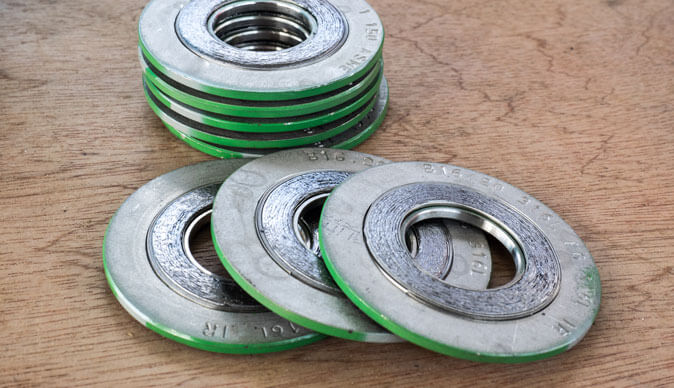Spiral wound gaskets are specialized sealing gaskets commonly used in industrial applications that require high-performance sealing under demanding conditions. They offer several benefits and are used in various industries.
Here are the key advantages and applications of spiral wound gaskets:
Benefits of Spiral Wound Gaskets:
- Excellent Sealing Performance: Spiral wound gaskets provide exceptional sealing performance, even in applications with high temperature, high pressure, or corrosive environments. They are designed to withstand extreme conditions and maintain a reliable seal, reducing the risk of leaks and ensuring system integrity.
- Versatility: Spiral wound gaskets are available in a wide range of sizes, materials, and configurations, making them highly versatile. They can be customized to meet specific application requirements, including different flange designs, pressure ratings, temperature ranges, and chemical compatibility.
- Pressure Resistance: Spiral wound gaskets are designed to handle high-pressure applications. The combination of metal and filler materials in their construction provides strength and resilience, allowing them to withstand significant pressure differentials and maintain a reliable seal.
- Temperature Resistance: These gaskets are suitable for both low and high-temperature applications. By selecting appropriate materials for the winding strip and the filler material, spiral wound gaskets can withstand extreme temperature ranges, ensuring sealing integrity even in harsh thermal environments.
- Chemical Compatibility: Spiral wound gaskets are available with various filler materials that offer excellent chemical resistance. This makes them suitable for sealing applications involving a wide range of fluids, gases, and chemicals, including corrosive or aggressive media.
- Resistance to Flange Imperfections: Spiral wound gaskets can effectively seal uneven or imperfect flange surfaces. The spiral winding design allows the gasket to compress and fill gaps, surface irregularities, or flange distortions, ensuring a reliable seal even in less-than-ideal sealing conditions.
- Longevity and Reusability: Spiral wound gaskets are designed for durability and long-term performance. They can withstand repeated use and provide reliable sealing over extended periods. Additionally, they can often be removed and reinstalled without significant damage or degradation, allowing for gasket reusability and cost savings.
- Applications of Spiral Wound Gaskets:
- Oil and Gas Industry: Spiral wound gaskets are widely used in oil refineries, petrochemical plants, and pipelines. They provide effective sealing for flanged connections in critical applications involving hydrocarbons, fuels, and corrosive fluids.
- Chemical Processing: Spiral wound gaskets are employed in chemical processing plants where reliable sealing is crucial. They seal flanges in applications involving acids, solvents, and aggressive chemicals.
- Power Generation: Spiral wound gaskets find application in power plants, including thermal power plants, nuclear power plants, and renewable energy facilities. They are used to seal flanged connections in boilers, heat exchangers, turbines, and other equipment.
- Pharmaceutical and Food Processing: Spiral wound gaskets are suitable for sanitary sealing applications in the pharmaceutical and food processing industries. They provide a hygienic and reliable seal in processes involving sterile fluids, pharmaceuticals, and food products.
- Pulp and Paper Industry: Spiral wound gaskets are used in pulp and paper mills to seal flanged connections in various equipment, such as digesters, pumps, and pipelines. They provide effective sealing against harsh chemicals and high-temperature environments.
- HVAC and Refrigeration: Spiral wound gaskets are utilized in HVAC systems, refrigeration equipment, and air compressors. They ensure sealing integrity in applications involving refrigerants, gases, and high-pressure environments.
Overall, spiral wound gaskets offer reliable and high-performance sealing solutions in demanding industrial applications, where pressure, temperature, and chemical resistance are critical.


